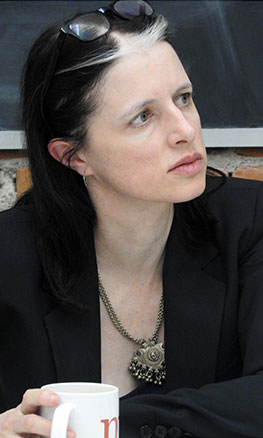 Suppose, for a moment, that the Good Samaritan didn’t rescue just one person merely by chance. Let’s say that he spent his entire life walking up and down mountain passes, finding wounded travelers by the hundreds, spending his children’s lunch money on the medical bills. Would we still respect him?
Suppose, for a moment, that the Good Samaritan didn’t rescue just one person merely by chance. Let’s say that he spent his entire life walking up and down mountain passes, finding wounded travelers by the hundreds, spending his children’s lunch money on the medical bills. Would we still respect him?
When New Yorker staff writer Larissa MacFarquhar looks at the world, she sees heroes and do-gooders, who go to moral extremes. In her November 15 campus presentation — part of the speakers series on — she drew the distinction.
Heroes have greatness thrust upon them by circumstances. We like them, because we could see ourselves behaving in the same way if the tables were turned. Do-gooders, on the other hand, often make us feel uncomfortable, because their altruism stretches beyond the pale. They sacrifice their own comfort and often the comfort of loved ones. They don’t confine their good deeds to their own social spheres.
In her book, Strangers Drowning: Altruism at Home and Far Away, MacFarquhar profiles several of these do-gooders, including an Indian lawyer-turned-doctor who launched a leper colony and a husband-and-wife team who adopted 20 children — young people who were unlikely ever to have a family because of age, race, or ill health.
Freud might have called their behavior moral masochism. His daughter would have spoken of altruistic surrender, the affliction that requires someone to obtain gratification through a proxy. MacFarquhar doesn’t buy it. “These people have a sense of purpose,” she said.
In wartime, MacFarquhar asserts, individuals are often called upon to make ultimate sacrifices. But decades have passed since World War II — the last time that Americans were asked en masse to think beyond the bonds of blood when calculating the value of life and property. Perhaps that fact has altered our perceptions of normalcy when it comes to performing good deeds.
Decide for yourself. Join the Lampert Institute audience for MacFarquhar’s presentation, archived at , and ask yourself the same questions that guided her research: “Is there a sense of too much morality? Can you push it too far? What would a life of moral extremity look like?”